What do camp counselors learn at camp that helps them later in life? The specific answers to that question are varied, but one thing remains constant—camp has a big impact on individual lives long after campers grow out of their camping and counselor years. Recently ReadyMade magazine featured Kelly Stoetzel in its regular series about awesome jobs. Kelly works for TED, a nonprofit devoted to “ideas worth spreading” and spends her days interacting with fascinating people from around the world who work to make things better. What was her first job? Camp counselor! And what does she list as her “Best Job”? Camp counselor!
 Kelly learned that “being a camp counselor is all about leading a group of people into enthusiasm,” and that continues to be important in her job today. Just as campers and staff still gather each summer—sometimes for the first time and sometimes after waiting all year just to come back—Kelly went to camp! There, learning, personal growth, fun and friendship blossomed during intense times and life-long skills and ideas were forged. Camp operates as a microcosm of experiences that mirror real-life situations as everyone negotiates friendships and different personalities, tries new things and finds their unique role in the group. If you’ve been a camper or a counselor, you know what I’m talking about. You also know that facilitating fun and teamwork takes creativity and enthusiasm. (If you’re thinking about being a counselor, camp is an incredible way to learn skills and prepare for future jobs!)
Kelly learned that “being a camp counselor is all about leading a group of people into enthusiasm,” and that continues to be important in her job today. Just as campers and staff still gather each summer—sometimes for the first time and sometimes after waiting all year just to come back—Kelly went to camp! There, learning, personal growth, fun and friendship blossomed during intense times and life-long skills and ideas were forged. Camp operates as a microcosm of experiences that mirror real-life situations as everyone negotiates friendships and different personalities, tries new things and finds their unique role in the group. If you’ve been a camper or a counselor, you know what I’m talking about. You also know that facilitating fun and teamwork takes creativity and enthusiasm. (If you’re thinking about being a counselor, camp is an incredible way to learn skills and prepare for future jobs!)
One counselor puts it this way, “Many aspects of camp allowed counselors to forget life outside of camp and just live in the present focusing on how to facilitate fun in the moment. I don’t think you get to do that as frequently in other life experiences, or at least you are not encouraged to do it as frequently.” She goes on to state that these skills are important in any profession and that camp administrators also served as references for her later jobs. For this counselor, camp led to asking questions about larger social structures at work in the world which led to going to graduate school and a career as a professor!
Another famous camper, Disney’s Michael Eisner, credits his many happy years at camp for teaching him to be honest, loyal and “willing to help the other fellow.” He’s quoted as saying, “Working in business can be another canoe trip!” You can read more about the impact camp had on Eisner’s life and career in his book Camp where he shares his memories and multiple lessons learned. If you’re a social and outgoing person and drawn to the opportunity to lead with enthusiasm, camp counselor could be the summer job for you–check out the AFSC website for more information.
Do you already have “camp counselor” on your resume? How has that experience contributed to your life or career?
Emma




 Once a young adult goes to college, no matter how much they miss home or home cooking, they are changed forever! One past camp counselor puts it this way, “After my first undergraduate winter break back home I decided I didn’t want to return home for three months during summer. College gave me independence/freedom from parental supervision, and I wanted to continue the experience through summer employment.”
Once a young adult goes to college, no matter how much they miss home or home cooking, they are changed forever! One past camp counselor puts it this way, “After my first undergraduate winter break back home I decided I didn’t want to return home for three months during summer. College gave me independence/freedom from parental supervision, and I wanted to continue the experience through summer employment.”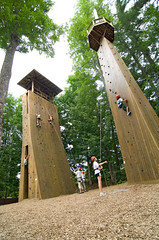 The
The 
 Here’s some of what’s happening at Camp Laurel. . .and what’s new for 2011. First, we’ve added a brand new Music and Recording Building for this summer. It’s a cutting-edge facility with separate studios for keyboard, guitar and drum lessons. For vocal ensembles, we have also added a state-of-the-art recording studio with the very latest in digital sound equipment. Laurel also added an amazing new Gaga Court and updated its fleet of watercraft with Four (Yes…4!) brand new Mastercraft Pro Star 197 Championship Tour Ski Boats and a new 16-Person Fishing San-Pan Pontoon Boat. That’s not all…we added a new Extreme Mountain Biking Track that’s out-of-sight AND underground-irrigated all our lawns and sports fields so we’ll be Laurel Green all summer long!
Here’s some of what’s happening at Camp Laurel. . .and what’s new for 2011. First, we’ve added a brand new Music and Recording Building for this summer. It’s a cutting-edge facility with separate studios for keyboard, guitar and drum lessons. For vocal ensembles, we have also added a state-of-the-art recording studio with the very latest in digital sound equipment. Laurel also added an amazing new Gaga Court and updated its fleet of watercraft with Four (Yes…4!) brand new Mastercraft Pro Star 197 Championship Tour Ski Boats and a new 16-Person Fishing San-Pan Pontoon Boat. That’s not all…we added a new Extreme Mountain Biking Track that’s out-of-sight AND underground-irrigated all our lawns and sports fields so we’ll be Laurel Green all summer long! While no actual human being develops in the precise
While no actual human being develops in the precise  As children mature, they continue to develop and require more experiences where they can make independent choices without parents. If parents don’t allow children to make decisions and do things on their own, they won’t develop confidence or realize that they are not just extensions of their caregivers. It’s a tricky line that parents walk! Sometimes giving child
As children mature, they continue to develop and require more experiences where they can make independent choices without parents. If parents don’t allow children to make decisions and do things on their own, they won’t develop confidence or realize that they are not just extensions of their caregivers. It’s a tricky line that parents walk! Sometimes giving child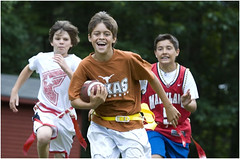
 Of course, the
Of course, the 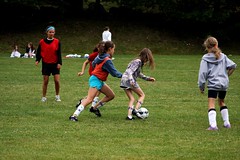 As parents, we are always on the lookout for experiences that help our children learn new skills. We enroll them in music lessons, martial arts, sports, theatre, choir and, of course, summer camps. But we all know that the best programs (and the best educational experiences) are ones that go beyond the basics of teaching skills to help develop our children’s character. The basics of character — trustworthiness, respect, responsibility, fairness, caring and citizenship — are all essential ingredients in summer camp experiences.
As parents, we are always on the lookout for experiences that help our children learn new skills. We enroll them in music lessons, martial arts, sports, theatre, choir and, of course, summer camps. But we all know that the best programs (and the best educational experiences) are ones that go beyond the basics of teaching skills to help develop our children’s character. The basics of character — trustworthiness, respect, responsibility, fairness, caring and citizenship — are all essential ingredients in summer camp experiences.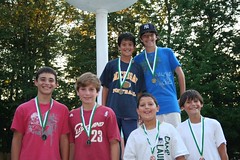 Everything we’ve written about on this blog so far — being ready for camp, unplugging from the digital world, traveling to camp, developing interpersonal communication skills, interacting with camp counselors, participating in camp traditions, and learning new sports and skills all contribute to building character.
Everything we’ve written about on this blog so far — being ready for camp, unplugging from the digital world, traveling to camp, developing interpersonal communication skills, interacting with camp counselors, participating in camp traditions, and learning new sports and skills all contribute to building character.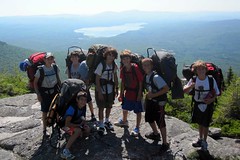 It’s no surprise, really. Camp activities, to be successful, require all the participants to have self-discipline and an unselfish sense of camaraderie. “There is just something about living with a group of boys,” mom Wendy says after sending her only son Justin to camp for the first time. Living communally in cabins and bunks requires teamwork, creativity and a willingness to work together.
It’s no surprise, really. Camp activities, to be successful, require all the participants to have self-discipline and an unselfish sense of camaraderie. “There is just something about living with a group of boys,” mom Wendy says after sending her only son Justin to camp for the first time. Living communally in cabins and bunks requires teamwork, creativity and a willingness to work together.
 In an earlier
In an earlier 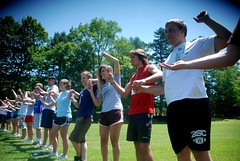
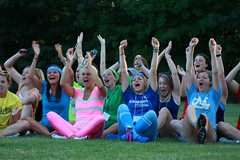 All this training and teamwork that begins in Orientation quickly spills over into a great summer for the kids. But the seven days of Orientation before camp starts is just the beginning. Camp staff attend weekly meetings and trainings, and everyone receives ongoing support from their supervisors on a daily basis. Without a well-trained staff, no camp can have a successful season. The right people – people who love children and are good at working with them – create the foundation for a terrific summer of experiences and memories for the most important people on campus, your children.
All this training and teamwork that begins in Orientation quickly spills over into a great summer for the kids. But the seven days of Orientation before camp starts is just the beginning. Camp staff attend weekly meetings and trainings, and everyone receives ongoing support from their supervisors on a daily basis. Without a well-trained staff, no camp can have a successful season. The right people – people who love children and are good at working with them – create the foundation for a terrific summer of experiences and memories for the most important people on campus, your children.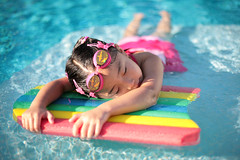

 The ways in which children understand and experience nature has changed beyond recognition for Americans born during the last two decades. While children today may be more aware of the global threats to our larger environment, they are much less aware of their immediate natural surroundings. As children, Louv and his peers may not have discussed global warming, or holes in the ozone layer, but they loved “their woods” and fields intimately and felt connected to the people and their location in the world. They identified specific bends and crooks in creeks and holes in backyards—explored the woods in solitude, lay in fields listening to the wind and marveled at clouds shape-shifting overhead.
The ways in which children understand and experience nature has changed beyond recognition for Americans born during the last two decades. While children today may be more aware of the global threats to our larger environment, they are much less aware of their immediate natural surroundings. As children, Louv and his peers may not have discussed global warming, or holes in the ozone layer, but they loved “their woods” and fields intimately and felt connected to the people and their location in the world. They identified specific bends and crooks in creeks and holes in backyards—explored the woods in solitude, lay in fields listening to the wind and marveled at clouds shape-shifting overhead. Louv discovered that
Louv discovered that 
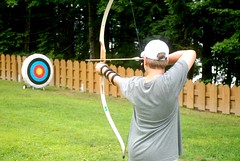 Many families are surprised at the sheer amount of first-time experiences their kids have at summer camp. When Justin, a 12 year old who attended camp this year, was asked to list things he did for the first time at camp, he had quite the list. “I learned how to play guitar, archery, and golf,” he said. During our conversation, it also came out that he also learned new baseball skills and got to play tennis. He also experienced the camp evening programs for the first time, which he raved about as being “fun and creative.” Justin’s going to be talking to a lot of people about camp when he goes back to school. And what is he going to tell them? “I made a lot of new friends and tried a lot of new things. I had the best time!”
Many families are surprised at the sheer amount of first-time experiences their kids have at summer camp. When Justin, a 12 year old who attended camp this year, was asked to list things he did for the first time at camp, he had quite the list. “I learned how to play guitar, archery, and golf,” he said. During our conversation, it also came out that he also learned new baseball skills and got to play tennis. He also experienced the camp evening programs for the first time, which he raved about as being “fun and creative.” Justin’s going to be talking to a lot of people about camp when he goes back to school. And what is he going to tell them? “I made a lot of new friends and tried a lot of new things. I had the best time!”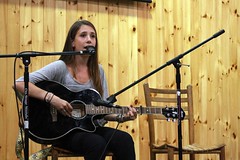 With today’s technology, however, the summer camp community can stay together all year, even when they return to the home cities, states and countries. We have an active Facebook community where current campers, families and alumni can connect, share stories and keep up to date with the staff and the current session. Much of the chatter is about how much everyone misses camp and wishes they were back on the lake, riding the horses, singing in the dining hall, etc. For those who’ve connected to Camp Laurel through
With today’s technology, however, the summer camp community can stay together all year, even when they return to the home cities, states and countries. We have an active Facebook community where current campers, families and alumni can connect, share stories and keep up to date with the staff and the current session. Much of the chatter is about how much everyone misses camp and wishes they were back on the lake, riding the horses, singing in the dining hall, etc. For those who’ve connected to Camp Laurel through 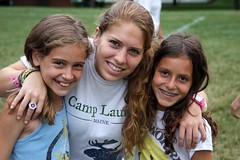
 …do a flip off the Mini-Tramp.
…do a flip off the Mini-Tramp. … flop in the lake…
… flop in the lake…